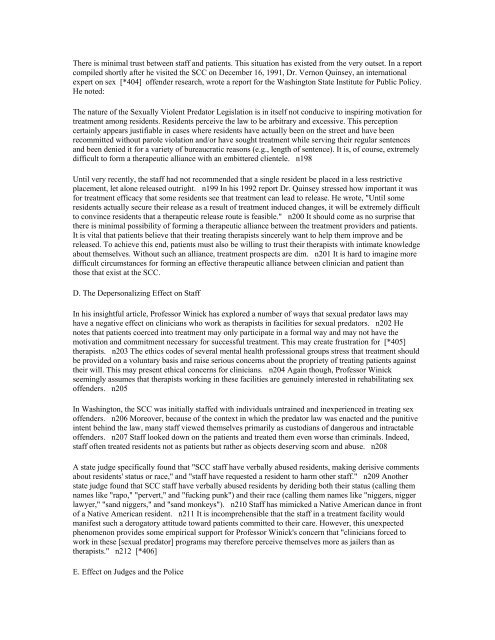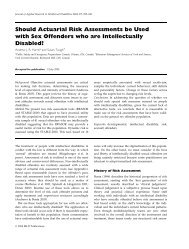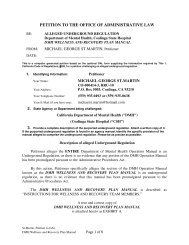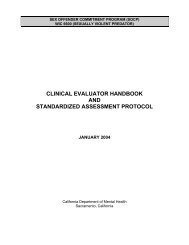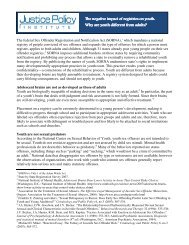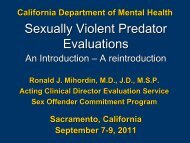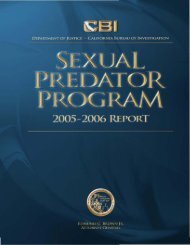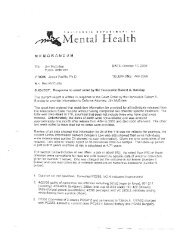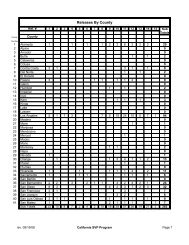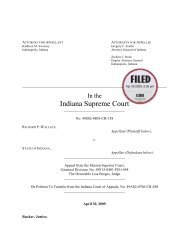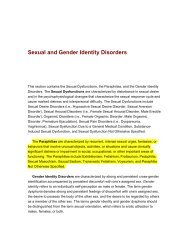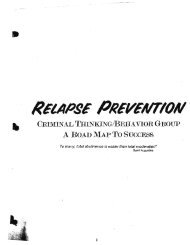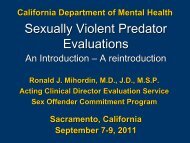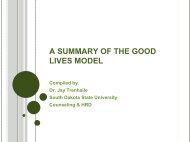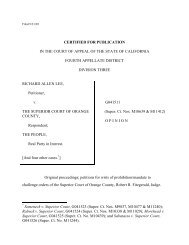Therapeutic Jurisp & Sexual Predator Laws - Defense for SVP
Therapeutic Jurisp & Sexual Predator Laws - Defense for SVP
Therapeutic Jurisp & Sexual Predator Laws - Defense for SVP
Create successful ePaper yourself
Turn your PDF publications into a flip-book with our unique Google optimized e-Paper software.
There is minimal trust between staff and patients. This situation has existed from the very outset. In a reportcompiled shortly after he visited the SCC on December 16, 1991, Dr. Vernon Quinsey, an internationalexpert on sex [*404] offender research, wrote a report <strong>for</strong> the Washington State Institute <strong>for</strong> Public Policy.He noted:The nature of the <strong>Sexual</strong>ly Violent <strong>Predator</strong> Legislation is in itself not conducive to inspiring motivation <strong>for</strong>treatment among residents. Residents perceive the law to be arbitrary and excessive. This perceptioncertainly appears justifiable in cases where residents have actually been on the street and have beenrecommitted without parole violation and/or have sought treatment while serving their regular sentencesand been denied it <strong>for</strong> a variety of bureaucratic reasons (e.g., length of sentence). It is, of course, extremelydifficult to <strong>for</strong>m a therapeutic alliance with an embittered clientele. n198Until very recently, the staff had not recommended that a single resident be placed in a less restrictiveplacement, let alone released outright. n199 In his 1992 report Dr. Quinsey stressed how important it was<strong>for</strong> treatment efficacy that some residents see that treatment can lead to release. He wrote, "Until someresidents actually secure their release as a result of treatment induced changes, it will be extremely difficultto convince residents that a therapeutic release route is feasible." n200 It should come as no surprise thatthere is minimal possibility of <strong>for</strong>ming a therapeutic alliance between the treatment providers and patients.It is vital that patients believe that their treating therapists sincerely want to help them improve and bereleased. To achieve this end, patients must also be willing to trust their therapists with intimate knowledgeabout themselves. Without such an alliance, treatment prospects are dim. n201 It is hard to imagine moredifficult circumstances <strong>for</strong> <strong>for</strong>ming an effective therapeutic alliance between clinician and patient thanthose that exist at the SCC.D. The Depersonalizing Effect on StaffIn his insightful article, Professor Winick has explored a number of ways that sexual predator laws mayhave a negative effect on clinicians who work as therapists in facilities <strong>for</strong> sexual predators. n202 Henotes that patients coerced into treatment may only participate in a <strong>for</strong>mal way and may not have themotivation and commitment necessary <strong>for</strong> successful treatment. This may create frustration <strong>for</strong> [*405]therapists. n203 The ethics codes of several mental health professional groups stress that treatment shouldbe provided on a voluntary basis and raise serious concerns about the propriety of treating patients againsttheir will. This may present ethical concerns <strong>for</strong> clinicians. n204 Again though, Professor Winickseemingly assumes that therapists working in these facilities are genuinely interested in rehabilitating sexoffenders. n205In Washington, the SCC was initially staffed with individuals untrained and inexperienced in treating sexoffenders. n206 Moreover, because of the context in which the predator law was enacted and the punitiveintent behind the law, many staff viewed themselves primarily as custodians of dangerous and intractableoffenders. n207 Staff looked down on the patients and treated them even worse than criminals. Indeed,staff often treated residents not as patients but rather as objects deserving scorn and abuse. n208A state judge specifically found that "SCC staff have verbally abused residents, making derisive commentsabout residents' status or race," and "staff have requested a resident to harm other staff." n209 Anotherstate judge found that SCC staff have verbally abused residents by deriding both their status (calling themnames like "rapo," "pervert," and "fucking punk") and their race (calling them names like "niggers, niggerlawyer," "sand niggers," and "sand monkeys"). n210 Staff has mimicked a Native American dance in frontof a Native American resident. n211 It is incomprehensible that the staff in a treatment facility wouldmanifest such a derogatory attitude toward patients committed to their care. However, this unexpectedphenomenon provides some empirical support <strong>for</strong> Professor Winick's concern that "clinicians <strong>for</strong>ced towork in these [sexual predator] programs may there<strong>for</strong>e perceive themselves more as jailers than astherapists." n212 [*406]E. Effect on Judges and the Police


